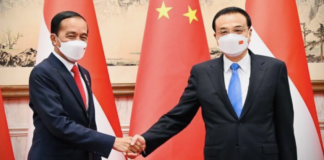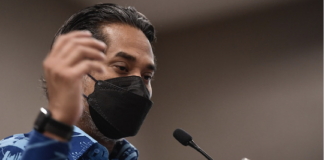Beijing,Dec 19 — Chinese State Councilor and Foreign Minister Wang Yi on Friday held a video meeting with the U.S. Asia Society, calling for the two sides to shoulder due responsibilities as major countries.
Amid the COVID-19 pandemic in 2020, all countries are more keenly aware of the need to strengthen international coordination and cooperation in addressing global challenges, in particular the role of major countries in setting an example, Wang said.
However, the United States interfered in China’s internal affairs on a series of issues and damaged China’s interests, which have pushed China-U.S. relations to their lowest point since the establishment of bilateral relations 41 years ago.
Noting that international order and relations have been severely impacted by hegemonism, protectionism and unilateralism, Wang said China and the United States should “adopt correct mutual perception toward each other, conform with the trend of the times, heed the call from the international community, and shoulder due responsibilities as major countries.”
“At the same time, China and the United States should work with other countries to jointly tide over difficulties, respond to challenges and seek common development,” said Wang.
China has been committed to an independent foreign policy of peace, Wang said, adding China has no intention to compete for hegemony, meddle in other countries’ internal affairs, or export its systems and development modes, let alone seek the so-called sphere of influence.
In spite of China’s earnest efforts to build China-U.S. relations on the basis of coordination, cooperation and stability, some U.S. politicians have made a series of strategic miscalculations over China-related issues, Wang said.
Wang said they have neglected the broad common interests and room for cooperation, smeared the Communist Party of China with ideological bias, attempted to bring China down to its knees via extreme pressuring, and sought for an anti-China coalition on the international stage.
China’s policy toward the United States is kept with stability and continuity, Wang said. “China-U.S. relations are never a zero-sum game, and the success of either party is not at the expense of the failure of the other party.”
“We hope the United States can work with China to rebuild a strategic framework for the stable and sound development of bilateral ties, with mutual respect as the premise, enhanced dialogue and consultation as the approach, deepened integration of interests as the driving force, and solid foundation of public opinion as the support,” Wang said.
He called on the two sides to address some prominent issues between the two sides in a constructive way.
Wang said China and the United States should respect each others’ choices about national systems and development paths, refrain from interfering in each others’ internal affairs, engage in dialogue and consultation concerning economy and trade rather than confrontation and sanctions, turn frictions into cooperation over maritime issues, and cancel a series of restrictions on people-to-people exchanges as soon as possible.
For the part of foreign representatives in attendance, they expressed the hope to see a more stable and predictable U.S.-China relationship, and appreciated China’s role in countering global challenges and constructive suggestions for bringing China-U.S. ties back on track.
They hope the two countries can shoulder responsibilities as major countries, conduct cooperation in such areas as pandemic response and climate change, and manage differences in a constructive manner.
More than 100 participants, including members of the Asia Society and members of the U.S. strategic sector, attended the event.
















